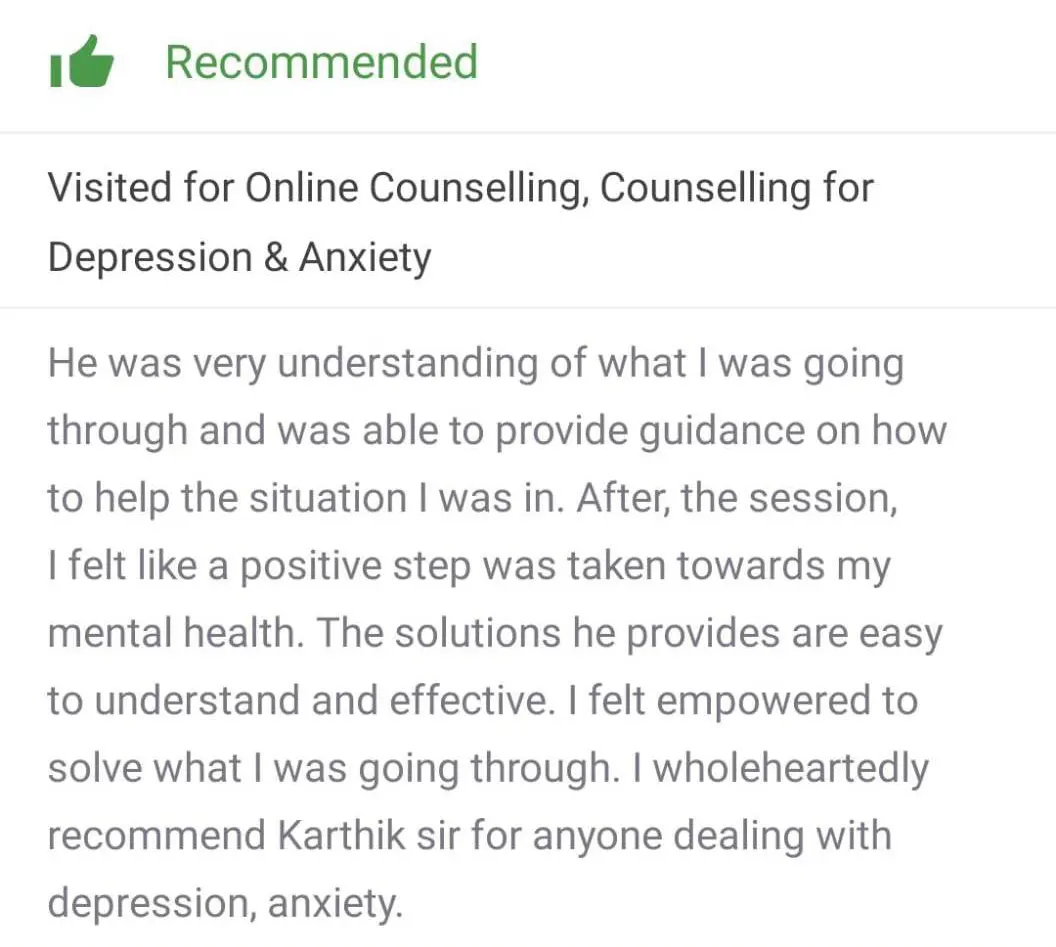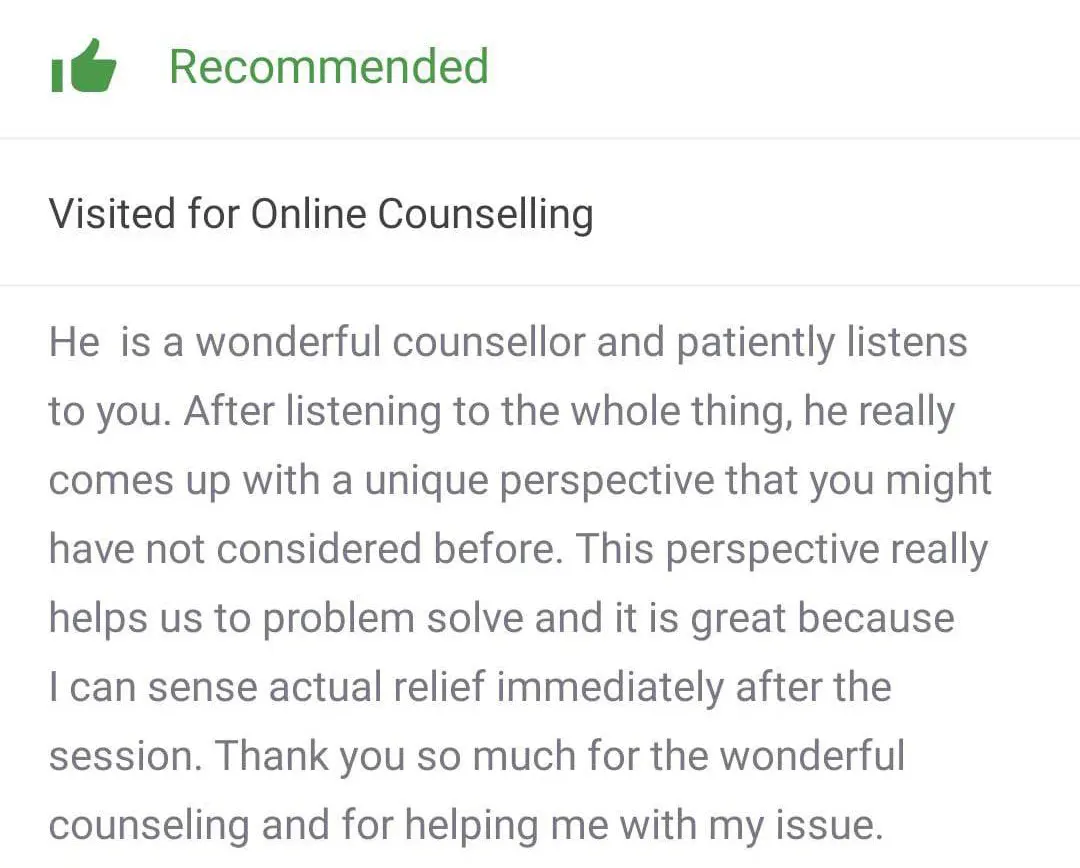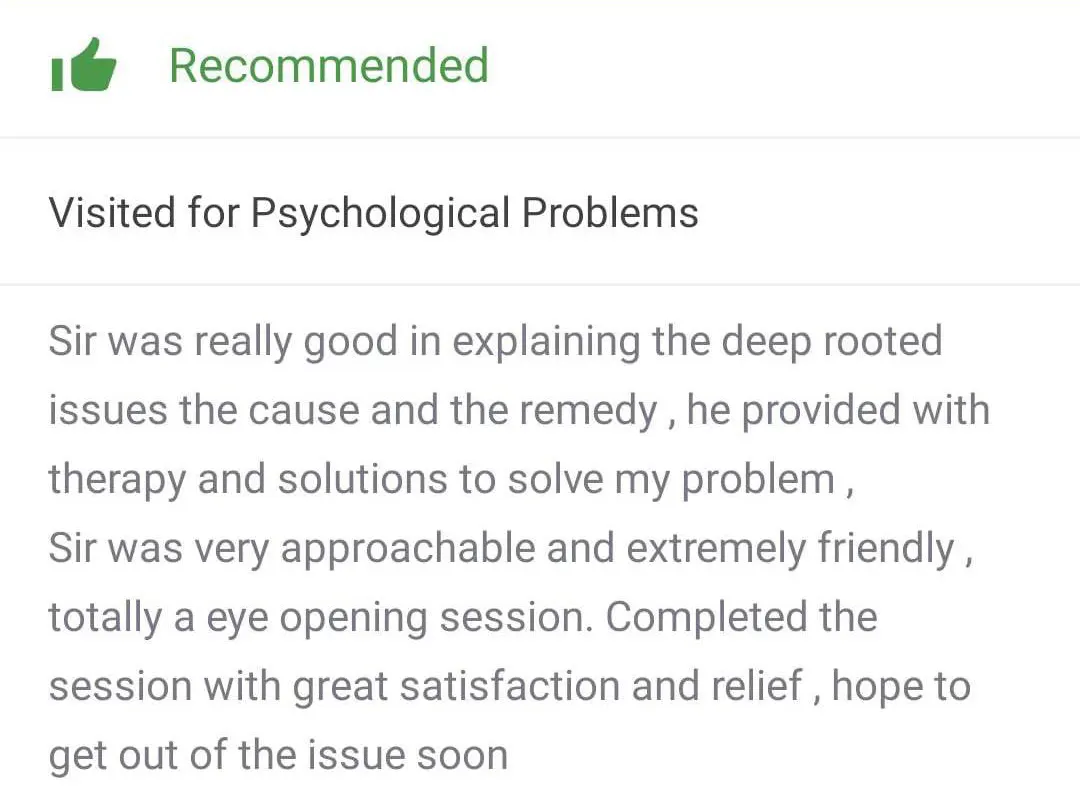Break-up/Divorce Counselling
Navigate the difficult road ahead with our Break-Up and Divorce Counselling services.

Our compassionate counsellors will support you as you work through the emotional aftermath of a break-up or divorce, helping you find closure and heal. Whether you’re struggling with feelings of loss, anger, or guilt, we’re here to help. With a focus on self-care, self-discovery, and coping mechanisms, you’ll be able to move forward with strength and resilience. Don’t let a break-up or divorce define your future, start your healing journey today with our Break-Up and Divorce Counselling services.
Mode of Counselling: Both In-Person/Online Counselling
Need Counseling?
Break-Up/Divorce Counselling for Psychological Issues
Are you going through a heartbreak because of Break up or divorce? There is nothing to be ashamed of! Believe us, this is the second most natural thing you can experience as a human being. Breakups involve feeling sorry, more for yourself than for the other partner. And, more than feeling sorry, in reality, it has more to do with rejection. Rejection of yourself and then, working on yourself to get over the developed sense of comfort. It seems easy, but the art of letting go takes time after a heartbreak and counselling can really help you sail your boat a little easier. In the end, you will be the one responsible for getting yourself out of feeling a heartbreak.
Chennai Counseling Services have a team of qualified counsellors that are available to talk to you. All you need to do is just book an appointment with one of our counselors. You decide the time and date according to your convenience looking at the available slots. We keep your identity anonymous. Your data and details are 100% kept confidentially.
Stages of Grieving
1. Denial
“Is it really over? I just can’t believe it!”
This stage involves where you are not able to accept if the relationship is really over and you develop alternatives in your head to make everything right.
2. Anger
“Why is this happening to me?! How could s/he do this?!”
The feeling of being betrayed and wronged can develop anger in you, which again is very normal if you have experienced a breakup.
3. Bargaining
“I need to get him/her back.” “Can we give this another shot?”
You try every rule in the book to try to make everything right or look for chances if there is some ray of hope of getting back with your partner.
4. Depression
“I can’t go on.”
You lose hope, and that my friend, is again very normal. You manifest and develop physical symptoms – like loss of appetite, excessive/deficient sleeping, persistent fatigue.
5. Acceptance
“What had to happen, happened.”
Now this is the final stage where you accept that certain things happened and make peace with it. It may not ensure happiness but makes your struggle with a heartbreak a little easier. It’s all about coming to terms with it and moving forward.

These processes are easier said than done. That is where the role of a therapist comes in where you learn to cope with everything in a more constructive and healthier way. There is nothing wrong if you seek relationship counselling or a breakup counselling. What matters is how you can help yourself get over the grief and make things work for you again. With the advent of technology, you may choose online counselling. If you choose online counseling, it becomes easier where you don’t need to step out of your comfort zone and still can talk to a psychologist who you can trust will have a 100% trusted break up help for you in order to help you to move on.
Tips from Experts for starter:
As experts in online breakup counselling and therapy, here’s what you can do for starters because what we, as break up psychologists, therapists, counsellors are looking at is to make things a little easier for you while you are going through such grief as heartbreak.
- Maintain Distance From Your Ex
- Talk Through Your Troubles
- Write Your Woes Away
- Show compassion to yourself
- Start Exercising
- Re-Invest in Other Spheres of Life
- Take Things One Day at a Time
And, last but not least, learn to believe in yourself. We understand that breakups can make you isolated, but this is not the end. Life goes on, and we will help to stand on your feet and let the world know that you exist.
Consult Our Experts
With the help of relationship and break up counsellors at Chennai Counseling Services you will help you learn how to cope with your break-up or a heartbreak effectively. What you get here is an expert counsellor with whom you can share things at your own pace and time. We do not believe in rushing things up! Our counseling techniques on love, heartbreaks and breakups involves years of research and tested counselling sessions so that you are able to cope with what you are going through effectively without having to destroy yourself in the process.
Our counsellors will talk to you via video call from the comfort of your home/office/ anywhere in the world or in-person based on the mode you choose and try to find out the real reason behind your heart break problem. Sometimes, all we need is just ‘talk therapy’ and we can identify and find a resolution. No matter what the nature of a relationship, be it marriage, civil partnership or simply your significant other, it is never an easy situation when you are facing a breakup, separation or divorce. Counselling can offer the space to take a step back and gain some objectivity and space. In relation to divorce and separation it provides a “pause” at a point when everything feels overwhelming and in turmoil.
Consequently, it can help to begin to see a way out of the pain and difficult emotion, although this can feel impossible to believe whilst in the middle of separating. Our Counselling for Relationship Breakups becomes an opportunity not only to form an understanding of what has happened, but to begin to heal, by rediscovering and connecting with yourself again. When a breakup causes overwhelming feelings that are difficult to cope with, interfere with the ability to complete daily activities, or influence the reevaluation of one’s life path, a therapist or counselor can often be a supportive, helpful part of the healing process, particularly when conditions such as depression, low self-esteem, grief, or post-traumatic stress develop following a breakup.
In Our counseling, a person can discuss any emotions or difficulties experienced and explore ways to cope with negative feelings. Our Expert therapist can help address any guilt or self-blame that may be experienced and help a person come to terms with the end of the relationship. Should a person feel suicidal or depressed after a breakup, a therapist can also help treat these conditions.
Need Counseling?
Popular Questions
We have answers to common questions people ask
Counseling is NOT advice/suggestion but helping people to help themselves. It is not telling what is right or wrong. It is NOT giving opinions or 3rd Person’s Point of View. Counselling will help you to improve your emotional/mental health by working on your thoughts/beliefs, feelings, needs and behavior. On the contrary, advice and suggestions will make the people dependent on the person who is offering them. Counseling will make people self-dependent and empowers you to problem solve and make decisions on your own. Counselling will also help you to prevent problems and also develop yourself as a better person.
- Press “Book a Slot & Pay” Button
- Choose the mode of counselling whether in-person or online.
- Choose the counselor or press any counselor
- The calender will open. Please see the available dates in green color. (Brown colored dates indicates slots are NOT available on those days)
- Click on the date you want the slot. It will show the available slots beneath in Green Color.
- Choose the slot you want and Press Next Step Button.
- Give the details of the client. Press Next Step Button.
- Choose any one of the Payment Gateways and make the payment of INR 1600/-:
- Razorpay (UPI/Gpay, Card & Netbanking) Press Submit Button and pay via the pop-up
- Stripe (Visa, Master, Mastro & Amex Card) Give the card details and Press Submit Button.
- After the successful payment, Appointment confirmation screen will appear. Please take a screenshot of that for your immediate reference. You will also get an email from us. If not found on inbox, please check spam and promtions.
We understand there are some fake organizations you might have come across and so getting doubtful about us is normal. The counselor himself maintains the data in the website. It is accurate. You may take screenshots and we assure you that we won’t change our words later.
If we try hard to make people trust us, some become more doubtful. We can’t help it. So we just request to consider the following to confirm our credibility. If you can’t trust us, better do not book appointment with doubts about our credibility. It is not possible to convince you to trust us.
- Verify our Govt. of India Registration Number: You can check our registration Number in https://udyamregistration.gov.in/Udyam_Verify.aspx Our Registration number with Ministry of Small & Medium Scale Enterprises, Govt. of India is UDYAM-TN-02-0007295 Please copy paste the the registration number and do not try to type as you may miss some characters.
- Verify GSTIN: You may visit https://services.gst.gov.in/services/searchtp and provide our GSTIN: 33AMLPR6303E1Z7. Please copy paste the GSTIN and do not try to type as you may miss some characters. Mobile version of the GST website is not working often. So kindly use laptop/PC to check. You can see our GST Registration certificate in our About Us Page https://counselingchennai.com/our-founder/
- Google Page: Go to www.maps.google.com or Open Google Maps app in your mobile phone and search for “Chennai Counseling Services/CCS Academy”. Regularly we update posts, photos and get new reviews. 700+ reviews are there (If you think all are fake/paid reviews, we can’t help it.)
- Payment Gateways: Payment part is fully taken care by Razorpay Payment Gateway and Stripe Payment Gateway. These are trustworthy gateways. Your payment data is processed in their websites. In case of any issues in the payment, you can contact their 24/7 customer care also.
If you are worried about giving your card details in gateways, please use NetBanking via Razorpay Payment Gateway, you will not give any bank related details in the website of the Gateway. You will just choose the bank under NetBanking and go to your bank website only. Please check whether your bank website is secure with “https” in the URL, check for the spelling of your bank in the address bar and see whether it looks the same way it was before and make the payment. - SSL Secured Website: Moreover ours is a secure website with “https”. You can click on the lock symbol of the address bar and check the full details of our SSL Certificate which proves that the data you give in this site is encrypted and secure.
Our counsellors want to understand the client’s emotions through the facial expressions, gestures and tone. So that we can help the client more effectively. In case of chat counselling, Phone/Audio Only counselling, these ques will be missing and the counselling will not be effective.
In the past some clients have booked appointment and never showed up for the session. So those slots went waste. Those slots could have been given to the people who required it. When we started collecting the full fee in advance and adopted no refund and no rescheduling policy, the no shows have become almost nil. We want people to commit to the appointment time taken.
Yes. If the client has any diagnosed psychological disorder and is under regular medication already, we will be able to treat.
It is based on various factors such as severity and onset of the issue, support system available, client’s motivation and engagement. When we assessed all of them and give an approximate number of sessions required in the past, some clients took it like we unnecessarily ask them to come for many sessions. So we stopped giving idea on the number of sessions required and we leave it to the discretion of the client. Client may choose to book appointment when he/she wants a session.
We never tell the clients to book many slots in advance. During the counseling sessions, we may discuss whether the next session is required or not and client can choose to book or leave it.
The clients will anyway pay for only one session every time. In the first session, you can evaluate whether counselling can help you and decide to book for further sessions or not. When you book for the next session, please make sure that you have an agenda for the session.
The client would bring the agenda for the session and counsellor will help to get a direction by working on your thoughts, emotions and behaviours. The agenda may be to resolve a problem or to prevent future problem(s) or to develop oneself.
If there is no diagnosis of any severe psychological disorder, counselling will surely help you. If you have been diagnosed to have disorders such as Schizophrenia/Bi-Polar Disorder/Personality Disorder by a clinical psychologist, Counselling will help with regular medication.
Counselor will first meet the client individually and spend more time. Family members/parent will be met later for a brief period of time. It will not be possible to update you about the things happened in the session owing to confidentiality. Our counsellor will try his best to empower your family member/child to communicate the things happened in the session to you directly.
Of course, well-wishers are very important people in our lives. Though talking to them may resolve some issues, there are many limitations. In the busy life of the present, friends and family have their own problems and may not be listening very carefully and unintentionally end up giving advices that may actually prove more harmful than helpful. They may not be able to look at you objectively. They can be biased unconsciously because they have preconceived notions about you. There is a possibility that they can influence you with their personal values and judgments. When issues are complex, they may become anxious and transfer their anxiety to you, whereas a professional assesses you based on scientific knowledge and thus the bias is very minimum and objectivity is very high. A professional will be able to help even if the issue is complex because he is well trained to understand people and possess the skills and qualities to help!
Counsellors help in learning new/different ways of thinking, feeling and behaving to resolve conflicts/problems/losses in everyday life.
Counseling is always voluntary. People should not be forced to go for counseling. Counsellors have respect for Privacy and Autonomy. Counselor will not give their personal opinions in right-wrong paradigm. He may guide the clients on the scientific facts. He will not influence the client by personal values and judgments. He maintains strict Confidentiality. He does not reveal the identities and things discussed in counseling to any other. The Counsellor has developmental and cultural sensitivity and act to avoid harming his clients. The relationship between Counselor and Client will be a professional relationship alone. He does not condone or engage in discrimination based on age, gender, culture, disability, ethnicity, sexual orientation, caste and religion. When he feels that he is not able to help the clients and lack in competence, he will refer the clients to competent professionals. Please see the Our Ethics Page for more details.
The individuals who accept that their own efforts have not helped and seek counseling voluntarily benefit the most! Please remember that counseling is NOT advice giving. Counseling help is not a “quick-fix” solution. It is an interpersonal process between the client and a trained mental health professional. Commitment on the part of the client and their families along with counseling professional bring greater results.
Both professionals often deal with similar mental health problems; however the focus of treatment tends to be different. Psychiatrists are medical doctors with M.D. in Psychiatry or Diploma in Psychological Medicine (DPM) and are recognized to prescribe medicines, specializing in the treatment of mental disorders.
A professional counselor is a psychologist who has the ability to define problems and identify the barriers that prevent them from thinking clearly. The counselor throws light on those barriers and works with the individual’s mental health by working on the thoughts, emotions and behaviours to develop proactive and objective solutions to problems. Psychiatrists and professional counselors may team up together in treatment process for better results for various psychological issues such as addictions, depression and anxiety that require medications.
In psychological counseling, it is generally considered better to meet the client first rather than informants. The primary reason for this is that the client is the direct recipient of the counseling and their perspective and experiences are crucial for understanding their mental health and well-being. By meeting the client first, the counselor can establish a therapeutic relationship with them, which is essential for effective counseling. This relationship helps build trust, empathy, and rapport between the client and the counselor, creating a safe space for open communication and exploration of their concerns.
While informants such as family members, friends, or teachers can provide valuable insights into the client’s life and behavior, their perspectives may be subjective or incomplete. Meeting the client directly allows the counselor to gather information firsthand and gain a comprehensive understanding of their unique circumstances. It also enables the counselor to assess the client’s mental health needs accurately and tailor the counseling approach accordingly.
Here are some of the potential concerns:
1. Lack of client perspective: Meeting the informant first may result in a limited understanding of the client’s experiences, emotions, and concerns. The counselor may form initial impressions or make assumptions based solely on the informant’s account, which can be subjective or incomplete.
2. Loss of client trust: If the client discovers that the counselor has met with an informant before meeting them, it may raise questions about confidentiality and trust. The client might feel that their privacy has been compromised or that their perspective has been misrepresented.
3. Inaccurate assessment: Without direct interaction with the client, the counselor may struggle to accurately assess their mental health needs, symptoms, or goals. The counselor’s understanding of the client’s situation may be based on second-hand information, potentially leading to misinterpretations or misdiagnoses.
4. Limited therapeutic relationship: Establishing a strong therapeutic relationship is crucial for effective counseling. By meeting the informant first, the counselor may miss an opportunity to build rapport, trust, and empathy directly with the client. This can hinder the therapeutic process and impact the overall effectiveness of counseling.
5. Ethical considerations: Meeting informants before clients raises ethical considerations related to confidentiality, informed consent, and professional boundaries. It is essential for counselors to prioritize the well-being and autonomy of their clients while adhering to ethical guidelines and legal requirements.
Counseling is always voluntary because it is a process that is based on the relationship between the counselor and the client. The client needs to be able to trust and feel comfortable with the counselor in order to be open and honest about their thoughts, feelings, and experiences. This is essential for the counseling process to be effective.
If counseling is not voluntary, the client is less likely to be engaged and to participate fully in the process. This can make it difficult for the counselor to help the client achieve their goals. Additionally, forced counseling can be harmful and can actually make the client’s problems worse.
The client must be initially motivated to attend at least their first appointment and maintain their drive to avoid dropping out. Collaborative engagement encourages the therapeutic alliance and improves treatment outcomes.
Need Counseling?


